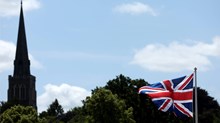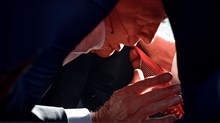President Bush's focus on denying nuclear weapons to the megalomaniacal regime in Pyongyang needs to be broadened, according to Jay Lefkowitz, the outgoing administration's special envoy for human rights in North Korea. There is good precedent, according to Lefkowitz:
Beginning in the mid-1970s, the West and the Eastern Bloc began a long dialogue on security, economic and human-rights issues. The key to the negotiations that ensued – known as the Helsinki Process – was explicit linkage between these three "baskets," with the West insisting on verifiable progress in each area as a condition of financial aid or international recognition.
...
Today, a Helsinki-style model should be replicated with North Korea, and the U.S. should promote linkage among security, economic and human-rights issues. Significant economic assistance to North Korea should be offered, including development assistance, World Bank loans, trade access and food aid, but it must be given only in return for tangible, verifiable progress on all issues on the agenda. And human-rights progress should not be measured by bureaucrats meeting and reading prepared statements, but by tangible steps that move North Korea closer to the norms of the international community.
Lefkowitz says such a shift presents an opportunity for the Obama administration:
To be sure, the policy I am proposing is diplomacy with our adversaries. But President-elect Obama has made that one of his goals. And if we pursue a comprehensive approach to North Korea, we may find that we'll not only advance our security objectives, but also help some of the world's most abused people.
And the human rights needs are great. According to the Voice of America:
Religious and human rights groups estimate that 150,000 to 200,000 people are believed to be held in political prison camps in remote areas of North Korea, some for religious reasons. Prison conditions are harsh, and refugees and defectors who have been in prison said that prisoners held on the basis of their religious beliefs generally are treated worse than other inmates.
For recent Christianity Today coverage of North Korea, click here.

Support Our Work
Subscribe to CT for less than $4.25/month


















